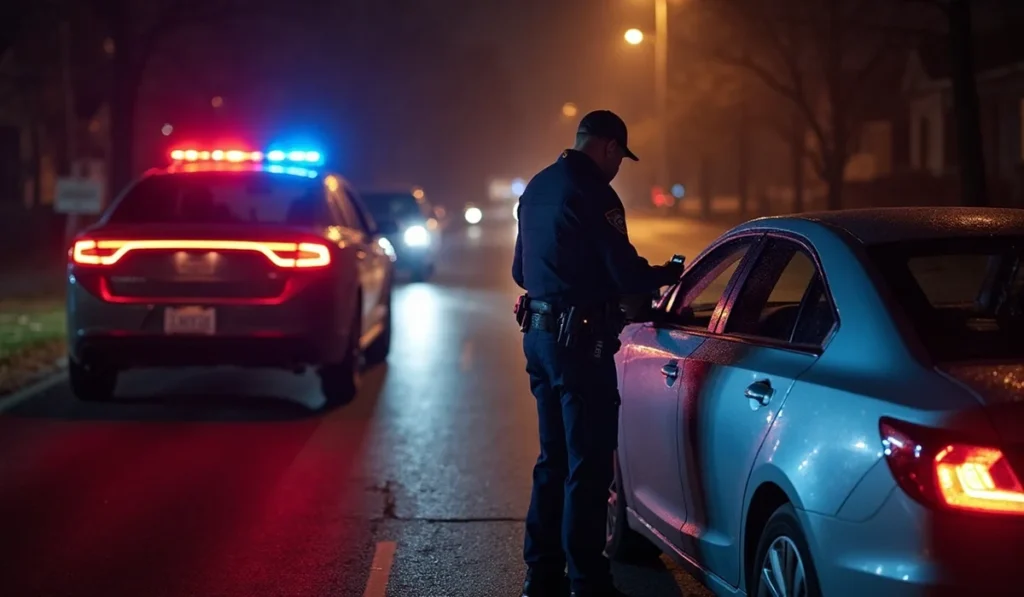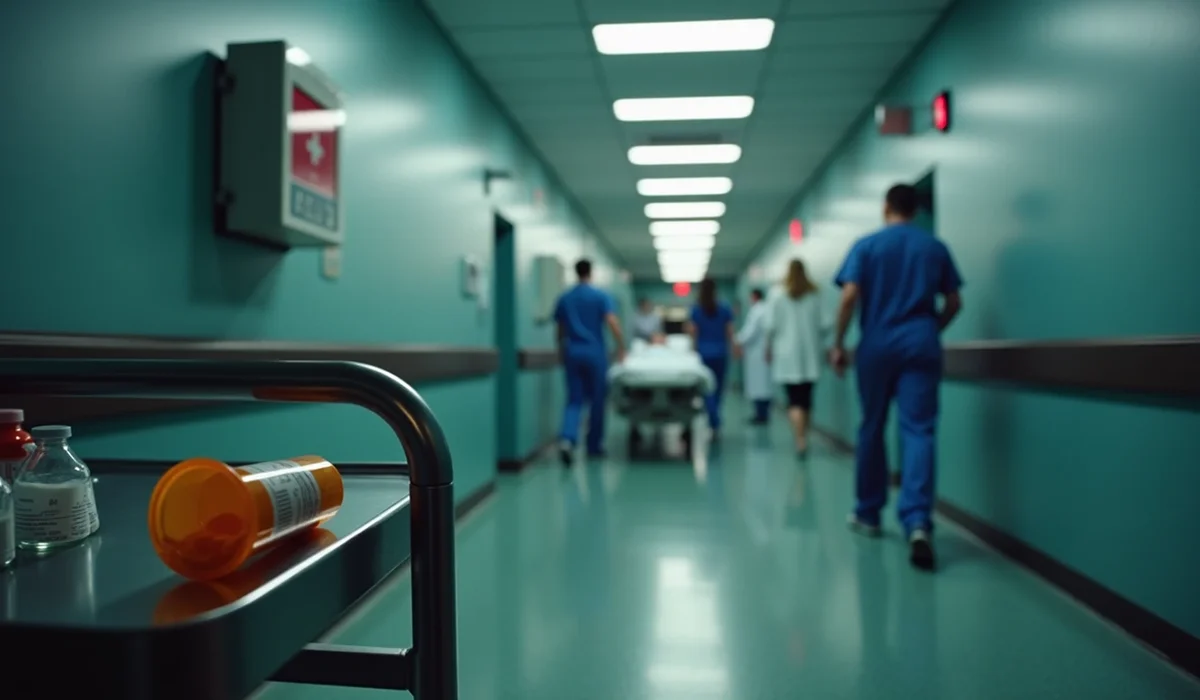Michigan’s THC roadside tests are under fire due to serious reliability issues. Recent data shows that one in four positive results turn out wrong, and false positive rates soar to 64% for some substances. Drug-related crashes dropped 8% between 2022 and 2023, but drug-related deaths climbed 3% during that time. These numbers paint a complicated picture of testing effectiveness and road safety.
Michigan lawmakers want to expand roadside drug testing capabilities. The state’s current laws treat driving with Schedule 1 drugs, including marijuana, just like drunk driving. Alcohol testing has proven roadside methods, but drug testing remains tricky. The push for better testing started after a heartbreaking event in 2013 when a drug-impaired driver killed two people. The whole ordeal led to calls for stronger testing procedures. The new laws would let police arrest drivers based only on saliva test results. Critics say this approach is flawed since THC can show up in saliva long after someone stops being impaired.
This piece wants to get into the public safety debate around Michigan’s THC roadside testing program. We’ll learn about lawmakers’ views, what supporters and critics say, and what it means for drivers and public safety.
Lawmakers advance THC roadside test legislation
Michigan lawmakers are moving ahead with legislation that would allow roadside drug testing across the state. The Michigan House of Representatives passed House Bills 4390 and 4391 with a 61-44 vote, and sent them to the Senate.
What House Bills 4390 and 4391 propose
The bipartisan legislation would let law enforcement officers use oral fluid testing to screen drivers for controlled substances, including marijuana. Officers would swab a suspect’s mouth and put the sample into a handheld device that gives results within five minutes. These SoToxa testing machines detect THC, amphetamines, methamphetamines, cocaine, opioids, heroin, and benzodiazepines and cost about $6,000 each.
Officers would run these tests after field sobriety tests and preliminary breath tests when they suspect drug impairment. A positive result at the roadside would lead to collecting a second sample “in a more secure setting” for lab confirmation. The legislation also allows officers to make arrests based in part or fully on these preliminary test results.
How the legislation compares to alcohol testing laws
These bills expand Michigan’s current alcohol testing framework to include drug testing. Rep. Brian BeGole explained that the laws “parallel the laws that we have now for the preliminary breath test machine”. The rules would add “other bodily fluid” (including saliva) to existing provisions that mention blood, breath, or urine testing.
Drivers who refuse a preliminary oral fluid analysis would face a civil infraction, just like with breath tests. Commercial vehicle operators would also receive a 24-hour out-of-service order if they refuse.
Which lawmakers and agencies support the bills
Rep. Brian BeGole (R-Antrim Township), the former Shiawassee County sheriff, and Rep. Julie Rogers (D-Kalamazoo) lead this bipartisan effort. The House Government Operations Committee gave unanimous approval with a 5-0 vote.
The bills have strong support from organizations like the Michigan State Police, Michigan Sheriffs’ Association, and Michigan Association of Chiefs of Police. The National Transportation Safety Board, which recommends states adopt oral fluid testing, offered written testimony supporting the initiative. The NTSB stated that “oral fluid is a valuable—but underused—biological specimen for detecting driver drug use”.
Oral fluid screening helps detect impaired drivers in 32 states. Indiana and Alabama have already put permanent programs in place.
Supporters cite public safety and crash data
Michigan’s THC roadside testing initiative gains public support as crash data reveals troubling patterns.
Drug-involved crash statistics from 2022–2023
Michigan State Police data shows drug-involved crashes dropped 8% from 2,452 in 2022 to 2,250 in 2023. However, drug-involved fatalities climbed 3% to 256 deaths. October recorded the highest number of drug-involved crashes at 209 incidents. Most crashes happened between 6 p.m. and 11:59 p.m.. The numbers paint a grim picture – all but one of these crashes in the last decade claimed nearly 2,500 Michigan residents’ lives.
The national statistics tell a similar story. The National Highway Traffic Safety Administration reports a 25% increase in drug use among nighttime weekend drivers since 2007. Cannabis use jumped 46% during this time. Marijuana now ranks second only to alcohol as the most common impairing substance found in crash-involved drivers.
Statements from Rep. Brian BeGole and AAA
Former Shiawassee County sheriff and bill sponsor Rep. BeGole highlights the personal impact of these numbers. “That’s a son, daughter, mother, father, sibling, or friend that isn’t returning home to their loved ones because someone got behind the wheel while impaired,” he stated.
AAA shares similar concerns about cannabis-impaired driving. AAA spokesperson Adrienne Woodland stated, “Marijuana causes impairing effects that make it unsafe to operate a motor vehicle”. A study by AAA’s Foundation for Traffic Safety reveals many drivers minimize these risks. About 47% believe cannabis barely affects their driving ability.
Why NTSB and NASID back oral fluid testing
The National Transportation Safety Board recommends Michigan should implement permanent oral fluid testing programs. This comes after NTSB data revealed drug presence in fatally injured drivers jumped from 30% in 2006 to 46% in 2015.
The NTSB and National Association of State Injury Directors see oral fluid testing as “a valuable—but underused—biological specimen for detecting driver drug use”.
Opponents raise privacy and racial bias concerns
Civil liberties groups and cannabis supporters have united against Michigan’s proposed THC roadside testing program. They express serious concerns about privacy violations and discriminatory enforcement.
ACLU’s concerns about search authority and racial disparities
The American Civil Liberties Union of Michigan strongly opposes the legislation. The organization focuses on expanded police search authority and unequal enforcement. Their policy strategist Gabrielle Dresner pointed out that Black drivers in Michigan represent about 21% of all traffic stops, though they make up only 14% of the state’s population. “As this bill broadens police search authority by instituting penalties on drivers who fail to comply with these tests, it increases the chance that traffic stop, search, and arrest disparities will worsen,” Dresner wrote. The ACLU also notes that these tests could unfairly affect people with disabilities who take legally prescribed medications.
Cannabis advocates warn of targeting legal users
Michigan Weedsters Association’s President Amie Carter has joined the ACLU in opposing the bills. “There is no compelling public safety justification for this legislation,” Carter stated. She emphasized that legal cannabis users could face targeting even when they’re not impaired.
Public fears over DNA misuse and civil liberties
Critics point out that saliva testing is nowhere near as simple as breathalyzers because it requires physical collection of oral fluids containing DNA. This raises significant questions about personal dignity, privacy, and the Fourth Amendment’s protections against unreasonable searches.
Experts question test reliability and legal use
Recent scientific data from Michigan’s 3-year-old THC roadside test pilot programs raises red flags about their effectiveness in identifying impaired drivers.
Pilot program results and false positive rates
Michigan State Police conducted pilot programs between 2018 and 2020 that revealed troubling accuracy problems with roadside drug detection devices. Blood test comparisons showed these devices were wrong nearly 11% of the time. Each Abbott SoToxa device used during these pilots cost around $6,000. Marijuana emerged as the most detected substance throughout these trials. The results showed that blood tests failed to confirm THC presence in 11 out of 74 positive roadside saliva tests. Scientists have reported overall false positive rates for THC testing ranging from 11.2% to 24%.
Limitations of THC saliva detection vs. impairment
We tested saliva samples that only showed the presence of drugs instead of measuring actual impairment. THC remains detectable in saliva for up to eight days after cannabis exposure, well beyond any impairing effects. The National Highway Traffic Safety Administration states that saliva test devices lack proven accuracy and reliability. A 2021 U.S. National Institute of Justice report concluded that “THC levels in bodily fluids, including blood and saliva were not reliable indicators of marijuana intoxication”.
Legal implications of test refusal and admissibility in court
Michigan courts only accept roadside drug test results under specific conditions, such as challenging an arrest’s validity. In spite of that, these results are the foundations of arrests and further investigations. Drivers who refuse the roadside saliva test receive a civil infraction without license points. However, refusing a subsequent blood test, which typically needs a warrant, leads to a one-year driver’s license suspension and adds six points to the driving record.
Conclusion
Michigan faces a tough choice about THC roadside testing. The debate centers on two key issues: public safety and individual rights. Drug-related fatalities have risen at an alarming rate and just need attention. In spite of that, false positive rates between 11% and 24% raise doubts about current testing technology’s ability to tell recent use from actual impairment.
Oral fluid screening exists in 32 states, but scientific evidence questions these tests’ accuracy in measuring impairment versus past use. THC stays detectable in saliva up to eight days after any intoxicating effects disappear. Legal cannabis users might face unfair punishment even when they’re not impaired.
The reliability problems aren’t the only concern. Police search authority expansion and racial disparities need serious thought. Michigan’s traffic enforcement shows Black drivers get stopped more often, and these new measures could make existing inequities worse.
Lawmakers keep pushing legislation similar to alcohol testing laws, despite these issues. Their efforts stem from real safety worries, especially with rising drug-related deaths. Test supporters believe officers just need these tools to keep dangerous drivers off roads.
Michigan’s lawmakers must weigh everything in this issue before they finalize any legislation. Finding the right balance between public safety and civil liberties is vital. The final system should rely on solid science that identifies actual impairment, not just past substance use. Road safety and individual rights are nowhere near negotiable – the stakes are too high.




